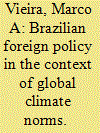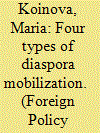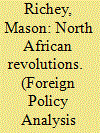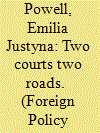|
|
|
Sort Order |
|
|
|
Items / Page
|
|
|
|
|
|
|
| Srl | Item |
| 1 |
ID:
124605


|
|
|
|
|
| Publication |
2013.
|
| Summary/Abstract |
This article is an enquiry into Brazil's evolving responses to global climate change norms. Following an overview of the evolution of international normative frameworks of climate change governance, I examine the relationship between some of these international norms and domestic environmental politics in Brazil. Internationally, the analysis focuses on the North/South political debate about climate change and its role in shaping understandings about the impact and responses to global warming. Domestically, I explore the evolving relationship between state and private actors in the decision-making process. I argue that Brazil's official position on climate change negotiations is currently influenced by a nationalist/developmental approach based on the particular worldview of the dominant faction within the foreign ministry and backed up by private groups, powerful sectors in the military establishment, key ministries, and the presidency. Yet, this worldview has been increasingly undermined/permeated by other state and nonstate actors, who are more closely aligned with the environmental concerns of international stakeholders. The ensuing domestic conflict has important implications for the legitimacy and coherence of the Brazilian position in international climate change negotiations
|
|
|
|
|
|
|
|
|
|
|
|
|
|
|
|
| 2 |
ID:
124616


|
|
|
|
|
| Publication |
2013.
|
| Summary/Abstract |
This comparative study explores the conditions and causal pathways through which conflict-generated diasporas become moderate or radical actors when linked to homelands experiencing limited sovereignty. Situated at the nexus of scholarship on diasporas and conflict, ethnic lobbying in foreign policy, and transnationalism this article develops four types of diaspora political mobilization-radical (strong and weak) and moderate (strong and weak)-and unpacks the causal pathways that lead to these four types in different political contexts. I argue that dynamics in the original homeland drive the overall trend towards radicalism or moderation of diaspora mobilization in a host-land: high levels of violence are associated with radicalism, and low levels with moderation. Nevertheless, how diaspora mobilization takes place is a result of the conjuncture of the level of violence with another variable, the linkages of the main secessionist elites to the diaspora. The article uses observations from eight cases of Albanian diaspora mobilization in the US and the UK from 1989 until the proclamation of Kosovo's independence in 2008.
|
|
|
|
|
|
|
|
|
|
|
|
|
|
|
|
| 3 |
ID:
124613


|
|
|
|
|
| Publication |
2013.
|
| Summary/Abstract |
In this paper, I discuss EU and member state externalization of the handling of non-EU, irregular migration flows. Following a historical and theoretical Introduction, I address in section "European Reactions to the Migration Flows Following the Arab Spring" the migration consequences of the 2011 North Africa revolutions, focusing particularly on how they provoked an EU migration policy crisis. Then, I show in section "Migration Policy Development in the EU: Fortress Europe or Strategic Incoherence?" how this was an outcome of the ineffectualness and strategic incoherence of EU immigration policy. This is ironic because the EU is criticized-incorrectly, I claim-for having developed a well-oiled non-entrée regime that skirts human/immigrant rights obligations by externalizing interdiction, detention, and processing of irregular migrants to countries with lower detention standards and higher human rights abuse rates. In section "The Member States' Role in the Externalization of European Migration Policy", I demonstrate that when such externalization policies are enacted, they are less due to EU action and more a function of member state decisions. I show that EU periphery member states are responsible for the most problematic policies partially because constraints on EU-level policy making incentivize these member states to erect "Fortress Europe" through their own devices.
|
|
|
|
|
|
|
|
|
|
|
|
|
|
|
|
| 4 |
ID:
124609


|
|
|
|
|
| Publication |
2013.
|
| Summary/Abstract |
For a long time, the People's Republic of China was known to be prone to use military force to settle foreign policy crises or interstate disputes. Extending Alexander Wendt's analysis of different cultures of anarchy, I argue that Beijing's famed violence proneness-that is, its propensity to use force-was historically a product of the militarized or Hobbesian worldview held by China's leaders during Mao's reign, when the PRC acted as a revolutionary challenger against the international system. Since Mao's death, however, China has been increasingly integrated into the system and, consequently, has experienced a Lockean turn in its worldview, which softens its predilection for violence. A systematic, quantitative test of my theory provides strong evidence that the evolution of China's militarized worldview, rather than its expanding relative power, played a key role in driving Beijing's resort to force between 1949 and 2001.
|
|
|
|
|
|
|
|
|
|
|
|
|
|
|
|
| 5 |
ID:
124600


|
|
|
|
|
| Publication |
2013.
|
| Summary/Abstract |
The International Court of Justice (ICJ) and the International Criminal Court (ICC) constitute two prominent international courts. However, there exists considerable variation in states' support for these two institutions. The Rome Statute, which recognizes the jurisdiction of the ICC has been ratified by over half the states in the world; only a third of states accept the compulsory jurisdiction of the ICJ. How are we to understand this variation in state support for these two courts? I argue that there is an inherent link between the quality of a state's domestic legal system (rule of law) and perceived legitimacy of an international court. Empirical analyses of states' support for the ICJ and the ICC show that rule-of-law states lend support to the ICC, a court perceived by the international community as legitimate. Alleged bias of the ICJ has, on the other hand, substantially weakened support for this court among rule-of-law states.
|
|
|
|
|
|
|
|
|
|
|
|
|
|
|
|
|
|
|
|
|